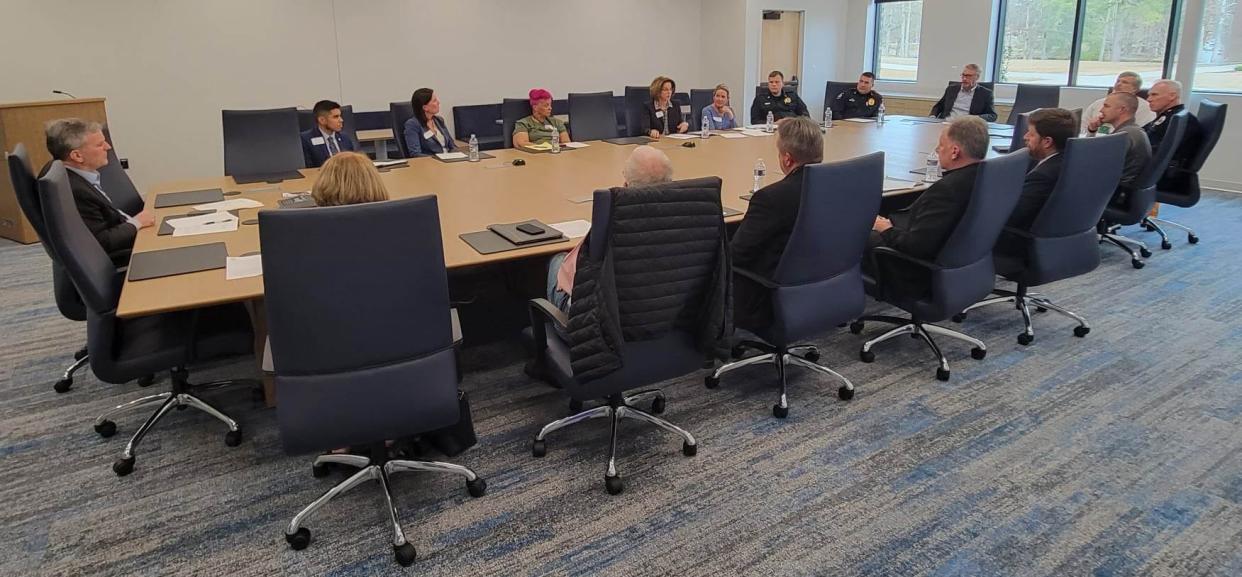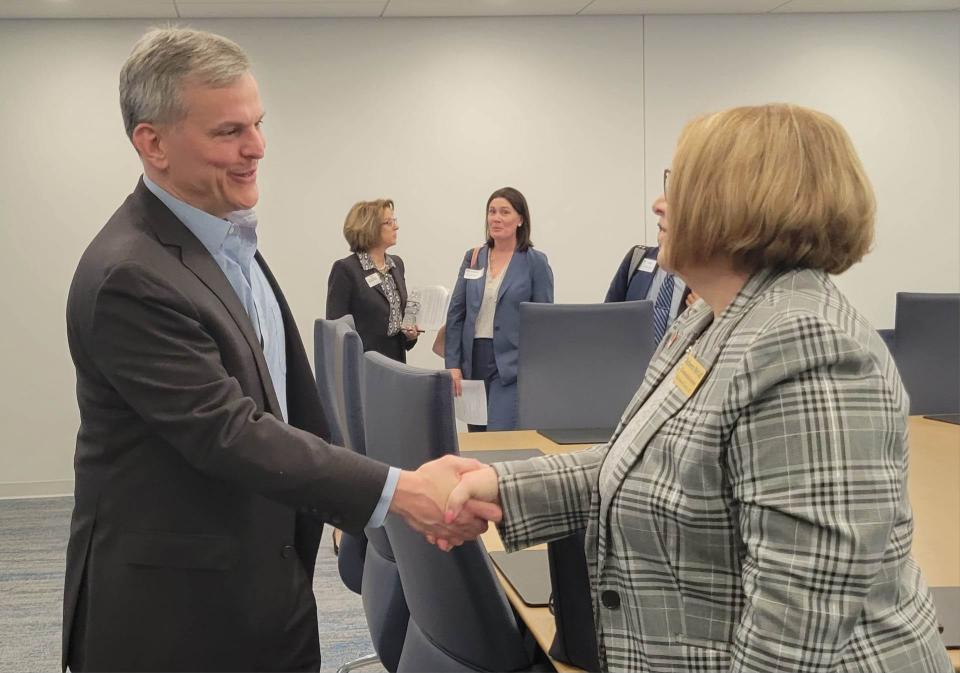Attorney General Josh Stein meets with area leaders to discuss opioid settlement

- Oops!Something went wrong.Please try again later.
FLAT ROCK - North Carolina Attorney General Josh Stein made a stop at Blue Ridge Community College on Feb. 21 to discuss allocation of the $26 billion in opioid settlement funds that he helped to negotiate.
North Carolina's share of the settlement is $750 million, which will be paid over an 18-year period. Henderson County will receive funding in two waves: The first wave will be $8,897,700 over an 18-year period, with an estimated additional amount of $7,046,134 in wave two.
Stein was joined by several community leaders, including Hendersonville Police Department Chief Blair Myhand, Henderson County Board of Commissioners Chair Rebecca McCall, other Henderson County commissioners (Bill Lapsley, Daniel Adreotta, David Hill, Michael Edney), Hendersonville City Council members (Jerry Smith, Debbie Roundtree), Henderson County Manager John Mitchell, Henderson County Health Department Director Steve Smith, District 29B Public Defender Beth Stang, Henderson County Emergency Services Director Jimmy Brissie and Blue Ridge Community College President Dr. Laura Leatherwood.

Stein said he was impressed how county leaders were already "ahead of the game" about use of those funds in the fight against opioid abuse in the region.
"You have already got a strategic plan in place, and I know when you made your initial funding decisions, it wasn't that you ran out of good ideas to fund. It was you didn't have enough funds to support all the initiatives you wanted to," Stein said. "With these funds, there is going to be more opportunities to put more resources back into our communities."
Stein was a lead negotiator in securing a $26 billion opioid agreement with the nation’s major pharmaceutical distributors – Cardinal McKesson, AmerisourceBergen and Johnson & Johnson. According to a news release, North Carolina’s local governments have been sent their first year of payments from the settlement. These funds will go toward addressing the opioid epidemic in communities across the state. In total, Stein has helped secure more than $50 billion nationally with drugmakers and pharmacies.
"We are now at the stage where the counties need to sign on," Stein said. "Enough states have joined. The next phase is for the counties to sign on. We had a 100-county unanimity the first go around, and we believe we'll get that and hope we'll get that the second round, because if everybody gets on board, then we all get more. That's the incentive. I'm hopeful there will be even more funds to support your good ideas."
Stein explained that the funds will have to go to things like prevention, harm reduction, treatment and recovery services. That's the plan for Henderson County as well, according to Mitchell.
"Counties really are the tip of the sphere when it comes to the opioid response," Mitchell said. "It's our deputies and our EMS which interact with these individuals on a daily basis. It's our courts and our detention center and our hospital which are rendering care. This substance abuse money is going to be used in order to address this crisis."
Stein heard from community leaders about how they plan to use the funds. First up was McCall, who told Stein the Henderson County Board of Commissioners had set up a task force prior to receiving the funds, and that the head of that task force was commissioner Bill Lapsley.
Lapsley then explained how the task force has been "very active" since 2018, when Stein advised commissioners of the future settlement.
"We formed the Henderson County Substance Abuse Task Force in 2019. We got together to come up with a strategy, because it was certainly our intention that once the funds were appropriated and we received them, we'd move ahead quickly," Lapsley said. "We had four clear recommendations: 1. Victims and victim assistance, 2. Control of substances, 3. Treatment programs, 4. Education and criminal justice. As the result of that report, county commissioners in the 2020-21 budget initiated a number of things. The first was the employment of a substance abuse advocator in our detention center. Even though we hadn't received any money (yet), the commissioners appropriated funds to do that. The commissioners also supported more mental health programs in our public school system that continues to this day. Third was continue to support school education programs through a non-profit organization here called Hope Rx. Fourth was to support our emergency medical services program, the county department, to help these people who with overdoses, and last was to continue to support the Sheriff's Department and their efforts of closing down substance abuse and drug traffickers."
According to the North Carolina Department of Health and Human Services, the rate of overdose deaths (per 100,000 residents) in Henderson County in 2020 was 29.8, and last year it was 27.6.
Lapsley re-convened the Task Force in 2022 after the funds from the opioid settlement were confirmed and the group came up with four key strategies for Henderson County to use the funds and ranked them by priority: 1. Recovery support services, 2. Evidence-based addiction treatment, 3. Early intervention services and 4. Criminal justice diversion. Lapsley also told Stein how the county and Hope Coalition had received a grant of $300,000 from Dogwood Health Trust to help combat the opioid crisis.
This article originally appeared on Hendersonville Times-News: Attorney General Stein meets with area leaders to discuss opioid settlement

